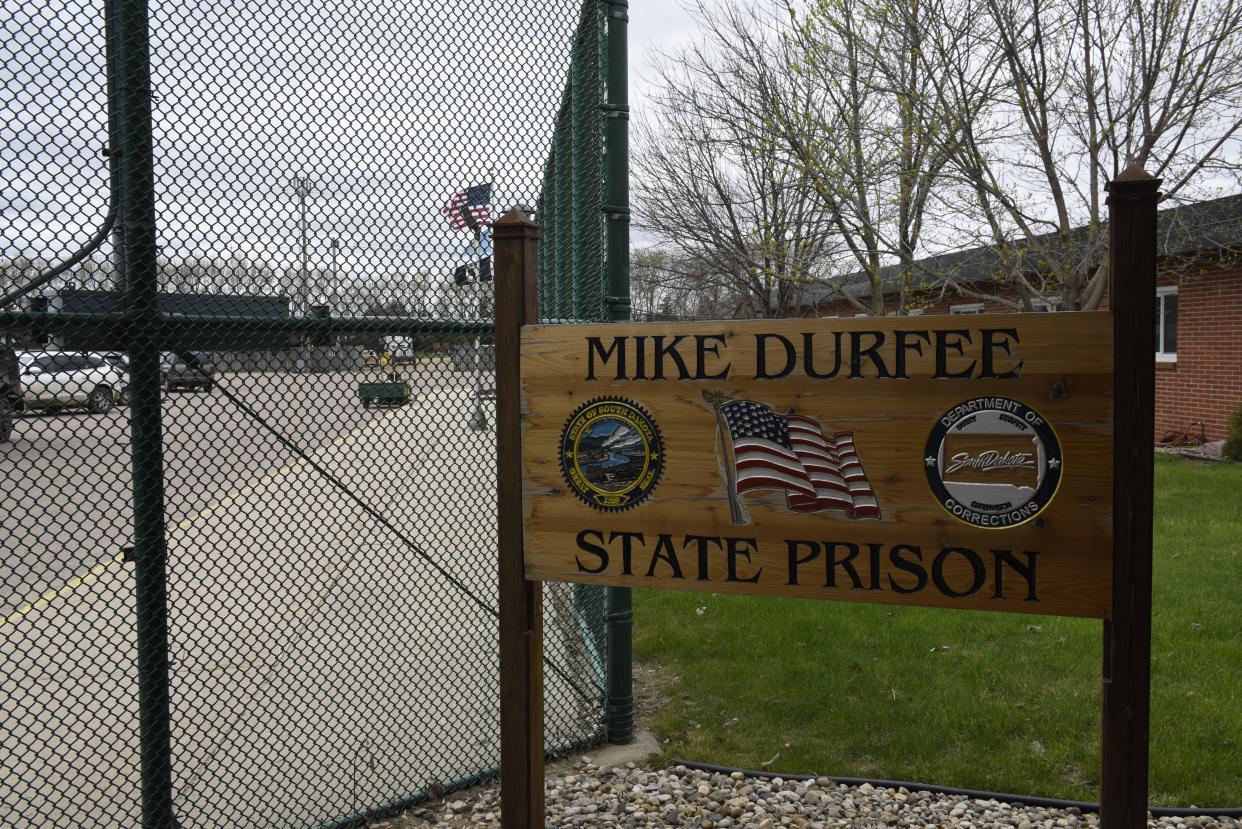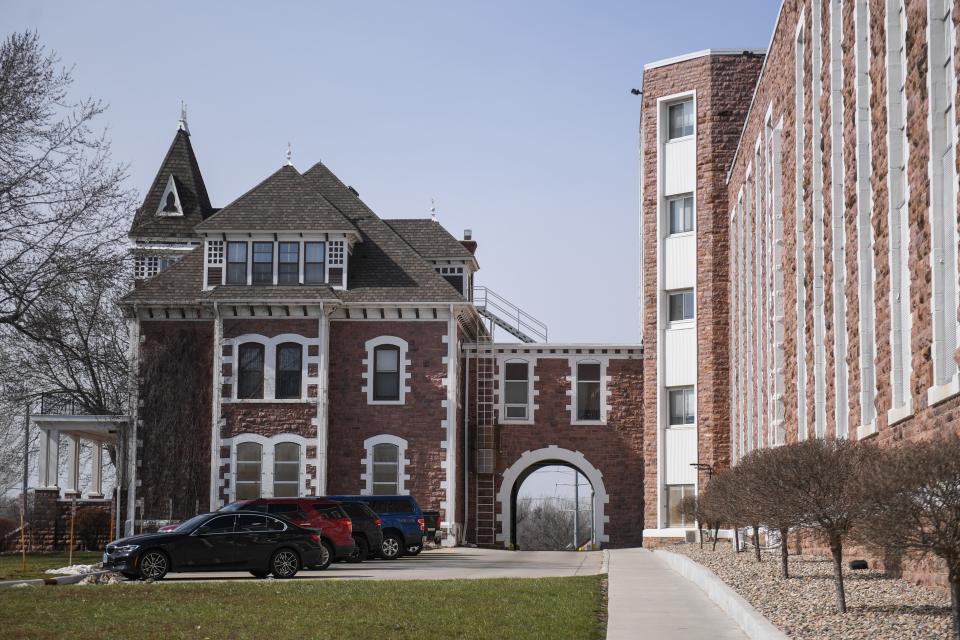'It's almost dehumanizing:' South Dakota inmates' phone calls limited at prisons across state

Updated 3:14 p.m. Thursday: South Dakota Department of Corrections released an updated memo Thursday on phone and tablet-based call limits for state prison inmates.
According to the DOC memo, the department will reinstate the ability for offenders to place calls using their personal tablets starting Friday.
Additionally, offenders will be able to make up to five 20-minute phone calls on tablets and in-house wall phones following a "discussion with the executive team and to promote offender communication with family and loved ones," the Thursday release states. An earlier memo sent to inmates Tuesday originally limited the number of calls prison residents could place per day to three.
Earlier story: Inmates at one of South Dakota's prison facilities say tensions are rising as residents prepare to lose a lifeline to their outside support systems.
The South Dakota Department of Corrections intends to limit the amount of phone calls that state inmates can make per day, as well as how long those calls can be, according to a Tuesday memo from Amber Pirraglia, DOC director of corrections.
The decision comes nearly a month after the DOC suspended phone calls and messaging services on inmate tablets as part of an investigation into what Gov. Kristi Noem has called "nefarious" uses of the functions, and several days after what state department leaders have called "disturbances" on back-to-back nights at the South Dakota State Penitentiary in Sioux Falls.
The ripple effects are now being felt at Mike Durfee State Prison, a medium security facility in Springfield, where inmates like Brian Anderson are transitioning from a paid instant messaging app to a more limited phone call allowance.
"I feel like these people are cutting me off from my support group, people that actually helped me rehabilitate, and are helping me to cope and help me want to be better to get back into society and do good," Anderson told the Argus Leader this week. "It's almost dehumanizing."
Anderson and other inmates received the memo earlier this week, which stated the department and the Inspector General's office "have worked to resolve an investigation" that led to the suspended features.
"In response to the investigation, the messaging app will continue to be disabled, indefinitely," Pirraglia wrote in the memo.
The statement also said the departments have worked to "establish appropriate guidelines for phone calls on tablets," which include limiting inmates to three phone calls a day, limiting the calls to 20 minutes in length and allowing calls to be made on either tablets or wall phones.

More: DCI will investigate both nights of 'disturbance' at the South Dakota State Penitentiary
"Phone calls could be reinstated as early as this week as we finalize the rollout schedule," Pirraglia wrote in a similar memo sent to DOC staff Sunday.
The Argus Leader reached Anderson on Tuesday evening, when he and other inmates received the new call guidelines on their tablet devices.
As of Wednesday morning, the more restrictive calling allowances have not been implemented at the Springfield prison.
However, the looming changes remain a source of frustration for some of the prison's residents, Anderson said.
"A lot of guys are starting to stress out over it," Anderson said. "You can already hear guys talking about, you know, retaliating against — I don't want to say it — non-inmates."
State inmates, prior to the March 8 suspension of tablet-based communication, had used the devices to communicate with friends and family members outside of prison. Both services were offered by GTL, a private company which contracts with the DOC.
Calls made through an inmate's tablet could last up to one hour. Inmates could also send text and photo messages through the app.
These messages are supposed to be subject to monitoring, according to the DOC's inmate access to telephones and tablets guidelines.
But Anderson alleged some inmates and their loved ones transitioned as early as September away from GTL's ConnectNetwork service to GettingOut, a GTL messaging app.
While they serve the same purpose, Anderson said he's noticed differences in how the app is monitored. Messages sent through ConnectNetwork, Anderson said, often needed to be approved, which could take hours or even days.
However, when the prison tablets began offering the GettingOut app, Anderson said messages to and from his contacts would often go through instantaneously.

Jade Chipps, a Florida resident whose partner resides at Mike Durfee State Prison, also said the inmate tablets began using GettingOut around that time.
"It's been nice, because, in the past, if you texted on a weekend when there wasn't a security guard monitoring the messages, it could take days for your text to get through," Chipps said.
Few details have been released about what led to the statewide investigation of the tablet usage, or the two "disturbances" at the South Dakota State Penitentiary within the last week.
A statement from DOC Secretary Kellie Wasko on March 27 noted at least one staff member had been assaulted in the first disturbance at the South Dakota State Penitentiary, but to what extent injuries were remains unclear. South Dakota Attorney General Marty Jackley directed the state's Division of Criminal Investigation to investigate both nights of disturbances and prosecute anyone responsible for harming correctional officers, inmates or state property.
Wasko also said Friday the state penitentiary was undergoing a search for contraband.
Anderson said the loss of privileges afforded by the tablets follows other restrictive measures taken by the DOC.
In late 2022, DOC facilities reduced a weekly cap on commissary purchases from $40 to $25. This has forced some inmates to choose between hygiene or medical products and food each week.
"If you have to buy Tylenol or medication or vitamins, they're so expensive," Anderson said. "You're sacrificing your commissary and you're forced to go eat nasty chow hall food, which they claim is better, but I can promise you it's not."
An anonymous inmate said this has led some Mike Durfee State Prison residents to extort fellow offenders for their commissary money.
The Argus Leader has chosen not to release the name of the inmate, who expressed concerns their physical safety could be compromised by inmates and prison staff for speaking about the extortion, as well as affect their ability to receive commutation for their sentence and an upcoming parole hearing.
"That's kind of important to us, because that's what we live on," the inmate said. "You're reducing our commissary, reducing our phone time. You're just progressing us to be hardened."
The inmate said other offenders who are seen as more vulnerable and those who have committed sex offenses are being targeted in particular.
"Now, they don't have much, so now they're going to go try and find more," the inmate said. "You're going to find a reason to get more."
More: DOC Secretary says large search for contraband at State Penitentiary ongoing
The Argus Leader has reached out to the DOC and Gov. Kristi Noem's office multiple times since March 28 to ask about the events, including what happened during and since the incidents, how "order was restored," and what policies the prison has regarding "disturbances."
The Argus Leader had yet to receive a response as of Wednesday afternoon.
This article originally appeared on Sioux Falls Argus Leader: Mike Durfee State Prison inmates' phone calls limited by DOC

